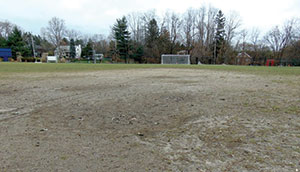Mount Pleasant School Athletic Facilities Bond Likely to Re-emerge in March

Mount Pleasant school officials are planning a $9.7 million athletic facilities referendum early next spring, a similar proposition to one that had been canceled two years earlier during the first few weeks of the pandemic.
The Board of Education may consider approving a resolution at its January meeting to schedule a vote for Tuesday, Mar. 29. If approved, key improvements would be made to the main multipurpose field at Westlake High School, including installation of an artificial surface, a resurfaced track that rings the field, LED lights so there could be night games, a press box at the back of the existing bleachers and a concrete pad for utilities to provide necessary power for food trucks to operate.
The five other surfaces at the high school and middle school campus would also get important upgrades, although grass would be maintained.
Replacing the main competition grass field with a hybrid turf consisting of crushed rubber granule and ceramic-coated sand would be suitable for the multiple sports that are played at the high school, said Erik Boe, from LAN Associates, the district’s engineering firm for the project.
“For a district like Mount Pleasant that has a lot of teams and a lot of play on the fields that you do have, the only way you can keep your field looking green and to allow play for your multiple different sports at all times of the day in all weather conditions, artificial turf is really a great solution,” Boe said.
A potential referendum comes nearly three years after a public forum was held where community members pressed school officials for improvements to the playing surfaces, among other work.
Grass fields need periods of time to rest and are susceptible to deterioration following rain, forcing postponements or having the Mount Pleasant football, lacrosse and soccer teams play more road games.
At the time, the district stated that of the 72 high schools in Section 1 athletics, Westlake was one of only seven without an artificial playing surface.
Boe said the surface that he referred to as Field B, a non-regulation-sized field, would be regraded because of a downhill slope at one end and have improved drainage. There would also be a new scoreboard and goalposts, and netting at the top end of the field to prevent balls from leaving the playing field, he said.
There would be regrading, drainage improvements and the installation of new sod at Field C.
The existing softball field, which Boe called Field D, is in good condition and would only need new dugouts and bullpens.
The final two surfaces, Fields E and F, the existing baseball fields, would each see similar drainage and irrigation improvements and new grass. Field E’s infield would be reskinned with new clay and Field F would need new dugouts and bullpens, Boe said.
Paul Tozzi, president of Arris Contracting Co., which the district had retained for the aborted March 2020 bond vote, said the price of the bond would be $9,777,000, about $700,000 more than two years ago. However, there are a few add-alternate items that the Board of Education could delete from the proposal to save money, Tozzi said.
Add-alternate items that could be eliminated would be a planned visitors’ bleacher and accessibility ramp at the main field for a combined $225,000 and an additional sidewalk around Field B for $81,000, he said.
If the district wanted to install artificial turf for Field B, it would cost an estimated additional $1.3 million, Tozzi added.
Under the projected timeline, if voters approve the bond in March, a design would be completed in spring to send to the state Education Department (SED) for approval. Provided SED approval is granted in time, work can start on the main field after next fall’s football season and be completed over the following year.
“We are sequencing the fields through so that we take over one field and give that to you before we start on another field so we’re always leaving you with playable surfaces along the way,” Tozzi said.
Despite the additional expense, district financial adviser Chris DeCarlo said that with persistently low interest rates, which have helped the district’s 2016 $39.6 million infrastructure bond remain below projected costs, and with existing debt service coming off the books by 2024, there would be no impact on the tax rate.
DeCarlo said projections for the athletics bond assume a 4 percent interest rate for a Bond Anticipation Note (BAN) that would be needed in early 2023 and a 5 percent rate on serial bonds to fund the bulk of the project. Currently, those rates are between 1 and 1.5 percent for the BAN and 1.5 and 2 percent for the bonds.
The $1,048,000 start in local share payments for 2024 would virtually match what would be coming off the books at that time, he said.
“It fits seamlessly and it dovetails in with your existing debt service and your local share,” DeCarlo told the board at a recent meeting.
Tozzi said the district would also be eligible for a percentage of state aid if the district includes a minor building component in the project.
There may be further discussion of the referendum at this Wednesday evening’s Board of Education meeting.

Martin has more than 30 years experience covering local news in Westchester and Putnam counties, including a frequent focus on zoning and planning issues. He has been editor-in-chief of The Examiner since its inception in 2007. Read more from Martin’s editor-author bio here. Read Martin’s archived work here: https://www.theexaminernews.com/author/martin-wilbur2007/
